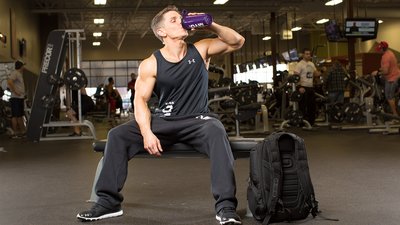If you're following a ketogenic diet, you can't get away with slamming back a sugary sports drink as you step onto the weight-room floor. That hearty bowl of oats or chicken and rice that a bodybuilder likes to eat prior to a workout? It's not for you. Instead, you need to get the fuel you need from within.
Luckily for you, if you've set up your ketogenic diet properly, you're uniquely equipped to produce your own fuel. Seriously, once you're fat-adapted, you have access to tens of thousands of calories of fuel found within the fat distributed throughout your body.
Still, if you're accustomed to the old way of fueling your training, it can be hard to know how to eat for performance under a low-carb model. Here's what you need to know!
Follow a True Ketogenic Diet, Not Your Own Variation
If you want to have limitless fuel at your disposal while following a ketogenic diet, it's imperative that you set your plan up correctly and adhere to it consistently. The ketogenic diet is a very-high-fat, moderate-protein, very-low-carbohydrate diet. To enter and stay in nutritional ketosis, your calorie distribution needs to look as follows, especially in the early going:
- 70-75 percent of calories from fat
- 15-20 percent of calories from protein
- 5-10 percent of calories from carbohydrates
Notice I used the word need? I'm not being dramatic. Some lifters, like Jason Wittrock, find they can have an occasional moderate-carb day and not slip out of ketosis, but—and this is a big "but"—these are experienced athletes who have been following the diet for years and test their ketone levels regularly. Strict adherence is necessary, especially at first!

As Wittrock noted in the article "Ketogenic Diet: Your Complete Meal Plan and Supplement Guide," being strict means counting your macros in nearly all cases. Otherwise, you not only put yourself at risk of eating too many carbs, but too much protein, which can also be converted to glucose in the body.
Once you become "keto-adapted," your body transforms into a highly-efficient, fat-burning machine. At that point, you may find you can tolerate more protein. But first, you have to earn it with months of consistency.
Become a Master Snacker
A banana or a handful of dried fruit before a workout isn't for you. Instead, you need to be a bit choosier when it comes to your ketogenic fuel supply. But for many people, that can be problematic, because heavy fats in the stomach don't always feel good during a workout.
It will take experimentation to discover what works best for you, but in general, eating a high-fat meal minutes before training isn't the best idea. A keto-friendly meal-replacement shake is one solid choice, but the following foods can also help you feel like you've got something in the tank without that something being a heavy load of bacon and whipping cream.

- Nuts: almonds, pecans, macadamia nuts and walnuts
- Cheeses: mozzarella, cheddar, goat, Swiss, and blue cheese
- Avocados
- Pork rinds
- Deviled eggs
- Cream cheese and berries
- Pepperoni slices
- Cold cuts and cheese roll-ups (watch for added sugar content in both!)
- Veggies (green and red peppers or cucumbers) with Ranch dressing
- Celery with cream cheese
- Coconut oil
Read that list again: Yes, veggies and berries are OK on the ketogenic diet. Don't be afraid of either in moderate amounts!
Try Medium-Chain Fats Pre-workout
If you're pressed for time and feel you need a bit of a pick-me-up, consider medium-chain triglyceride (MCT) oil, either on its own or in addition to the snacks above. MCTs digest quickly and can be readily broken down for fuel.
Most sources of fat—think avocado, eggs, or nuts—contain long-chain triglycerides (LCTs), which, once eaten, require help from a carrier protein molecule to get into your body's fat-burning furnace, the mitochondria. This can be a timely process. MCTs don't need this carrier protein to be broken down, so they're readily available to fuel your workout.
Many keto dieters find MCTs to be something close to a dietary silver bullet, allowing them to more easily meet their ambitious daily fat goals, and even a rush of mental clarity and energy when they need one. But when you're first trying them, I don't recommend going over 15 grams or so in a single sitting, as more than that can lead to stomach distress.

Use HMB to Protect Your Existing Muscle Mass
Becoming keto-adapted can take longer than many people realize. Sure, most of the important processes start to take hold in the first 2-4 weeks, but experienced ketogenic adherents will tell you it takes months for your body to be become fully accustomed to this dramatic shift in fuel.
At first, when your body is still desperately seeking carbs, you'll want to do everything you can to keep your existing muscle mass from getting used as fuel. Giving your body adequate amounts of dietary fat is essential here, but you can further guard your gains by taking an anticatabolic supplement such as HMB.
This molecule is a metabolite of the essential amino acid leucine, and has been shown to both reduce muscle damage and muscle breakdown for fuel from weight training.[1,2] If you're training in a fasted state, either just for cardio or as part of a combined ketogenic/intermittent-fasting protocol, then minimizing muscle loss is doubly important!
Beyond HMB, a host of supplements can not only support your keto diet, but also help you maximize your workouts in the absence of much in the way of carbohydrates.
For many, there's no part of the fit life more confusing than nutrition! But it doesn't have to be that way. In Foundations of Fitness Nutrition, two Ph.D. dieticians tell you all you really need to know about calories, macronutrients, exercise nutrition, and how to eat to lose or gain weight!
References
- Panton, L. B., Rathmacher, J. A., Baier, S., & Nissen, S. (2000). Nutritional supplementation of the leucine metabolite beta-hydroxy-beta-methylbutyrate (HMB) during resistance training. Nutrition, 16(9), 734-739.
- Nissen, S., Sharp, R., Ray, M., Rathmacher, J. A., Rice, D., Fuller, J. C., ... & Abumrad, N. (1996). Effect of leucine metabolite beta-hydroxy-beta-methylbutyrate on muscle metabolism during resistance-exercise training. Journal of Applied Physiology, 81(5), 2095-2104.



